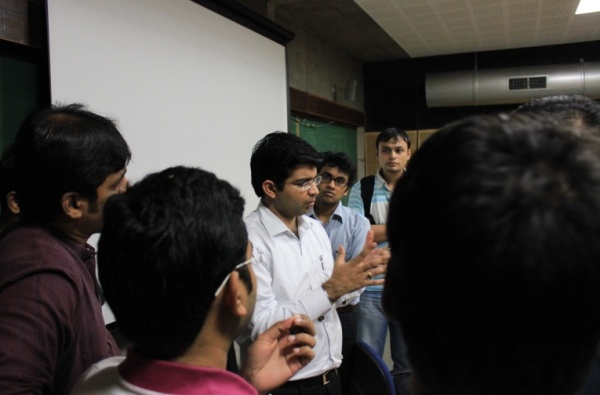At the launch of the speaker series, ‘Dream Chasers’, organized by the ENTRE CLUB, the Entrepreneurship cell of IIMA, “Mr. Manu Midha”, Vice president, Strategy and Planning, INFIBEAM came down to campus to deliver an insightful talk on his journey from being a banker to a vice president in a start up as well as about the e- commerce industry and its prospects.
Mr Manu Midha was working as a Sr. Analyst, IBD, JP Morgan India (Apr’10 – Nov’10) and is an alum of IIM A (2010 batch) with a background in engineering from IIT Kharagpur.
During the course of the talk he spoke about his motivation to be in a job that is closer to customers. He wanted an opportunity to observe consumer behavior and translate that to making profits. He wanted to do something that he “could do best” and for the same, he quit his job as a banker and turned to pursue his dream job. He spoke about his struggle at the beginning wherein he would not have a single customer or an employee for months and how he brought it to a point wherein he has about 14,000 clients lined up within a span of a year.
He then moved on to develop the students’ understanding of the e-commerce ecosystem, its major challenges and ways of dealing with them. He pointed out the biggest challenge of online retail that is inventory management. He said, “Knowledge of inventory is as good as having inventory itself” and this is the principle behind which online retail works. He also provided valuable insights into scaling up of e-commerce ventures, consumer behavior online, and the challenges present in Indian context.
He gave an opinion about the online consumer behavior in India and the challenges that it throws. High customer acquisition costs, a low click through rate, low conversion and a dearth of loyalty where some of the challenges looked into.
On the whole it was an extremely engaging experience for all those interested in the sector and gave a number of useful pointers to those thinking of starting their own ventures in this sector. It was also extremely motivational for those who think beyond the conventional placement process and would like to struggle to follow their dreams akin to the tagline of Dreamchasers –
“Dream… Believe… Achieve!”


